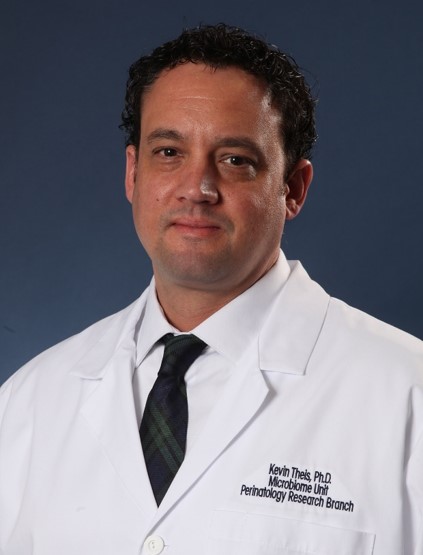Kevin Theis
Biography
Kevin Theis is an Associate Professor (Reserach Educator), tenured in the department of Biochemistry, Microbiology and Immunology.
Kevin Theis, Ph.D., is an associate professor in the Department of Biochemistry, Microbiology and Immunology for the Wayne State University School of Medicine.
Dr. Theis, a broadly trained behavioral and microbial ecologist, joined the School of Medicine in 2015. He received a bachelor’s degree in English from LeMoyne College in 1996 and a second bachelor’s degree with Honors in Environmental and Forest Biology from the SUNY College of Environmental Science and Forestry in 2001. He received his dual doctoral degree in Zoology and Ecology, Evolutionary Biology, and Behavior from Michigan State University in 2008, working in the laboratory of Dr. Kay Holekamp. He did his postdoctoral research in animal-microbial ecology in the laboratory of Dr. Thomas Schmidt, also at Michigan State University. Before joining the faculty at Wayne State University, Dr. Theis was a research assistant professor in the Department of Internal Medicine at the University of Michigan.
His research focuses on host-microbe interactions. Specifically, he is determining whether we can effectively manage the human microbiome in the context of maternal-fetal health and disease, and elucidating the reciprocal influences of the microbiome on animal behavior and animal behavior on the microbiome.
Office Address
Department of Biochemistry, Microbiology and Immunology
Wayne State University School of Medicine
540 East Canfield
Room 7130 Scott Hall
Detroit, MI 48201
Education/Training
BA in English from LeMoyne College
BS in Environmental and Forest Biology from the SUNY College of Environmental Science and Forestry
Dual Ph.D. in Zoology and Ecology, Evolutionary Biology, and Behavior from Michigan State University
Office Phone
313-577-9746
Honors and Awards
Wayne State University School of Medicine Research Excellence Award (2021)
Wayne State University School of Medicine College Teaching Award (2023)
Research
I have three principal research interests. First, my laboratory aims to efficaciously elucidate the structure, function, consequence, and transmission of microbiomes and their individual constituents within and across individual animals, families, social groups, populations, and species in defined ecosystems. Second, we aim to determine the extent to which elements of animals; phenotypes, including those of humans, which are under clear selective pressure, are emergent from their networked interactions with their microbiomes. Third, from a translational medicine standpoint, we aim to evaluate whether the structure of the reproductive tract microbiome, or hosts; respondent immunoproteome, can identify women early in pregnancy who are at risk of spontaneous preterm birth or other obstetric diseases such that preemptive clinical measures can be taken to mitigate the apparent risks.
Publications
- Panzer JJ, Maples C, Meyer MP, Tillotson G, Theis KR, Chopra T. Gut microbiome alpha diversity decreases in relation to body weight, antibiotic exposure, and infection with multidrug-resistant organisms. American Journal of Infection Control. 2024. Jan 2:S0196-6553(23)00877-5. doi: 10.1016/j.ajic.2023.12.017. Corresponding author
- Galaz J, Romero R, Greenberg JM, Theis KR, Arenas-Hernandez M, Xu Y, Farias-Jofre M, Miller D, Kanninen T, Garcia-Flores V, Gomez-Lopez N. Host-Microbiome Interactions in Distinct Subsets of Preterm Labor and Birth. iScience. 2023. 26(12):108341. doi: 10.1016/j.isci.2023.108341.
- Farias-Jofre M, Romero R, Galaz J, Xu Y, Miller D, Garcia Flores V, Arenas-Hernandez M, Winters AD, Berkpwitz BA, Podolsky RH, Shen Y, Kanninen T, Panaitescu B, Glazier CR, Pique-Regi R, Theis KR, Gomez-Lopez N. Blockade of IL-6R prevents preterm birth and adverse neonatal outcomes. EBio Medicine. 2023. 98:104865. doi: 10.1016/j.ebiom.2023.104865.
- Angoa-Perez M, Zagorac B, Francescutti DM, Shaffer ZD, Theis KR, Kuhn DM. Cocaine hydrochloride, cocaine methiodide and methylenedioxypyrovalerone (MDPV) cause distinct alterations in the structure and composition of the gut microbiota. Scientific Reports. 2023. 13(1):13754. doi: 10.1038/s41598-023-40892-1.
- Romero R, Theis KR, Gomez-Lopez N, Winters AD, Panzer JJ, Lin H, Galaz J, Greenberg JM, Shaffer Z, Kracht DJ, Chaiworapongsa T, Jung E, Gotsch F, Ravel J, Peddada SD, Tarca AL. The vaginal microbiota of pregnant women varies with gestational age, maternal age, and parity. Microbiology Spectrum. 2023. 11(4):e0342922. doi: 10.1128/spectrum.03429-22. Corresponding author
